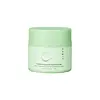What's inside
What's inside
 Key Ingredients
Key Ingredients

 Benefits
Benefits

 Concerns
Concerns

 Ingredients Side-by-side
Ingredients Side-by-side

Water
Skin ConditioningPropylheptyl Caprylate
EmollientGlycerin
HumectantPolyacrylate Crosspolymer-11
Emulsion StabilisingNiacinamide
SmoothingPropanediol
SolventPentylene Glycol
Skin ConditioningC15-19 Alkane
SolventDiheptyl Succinate
EmollientCapryloyl Glycerin/Sebacic Acid Copolymer
Skin ConditioningBifida Ferment Lysate
Skin ConditioningInulin
Skin ConditioningErythritol
HumectantC12-15 Alkyl Lactate
EmollientGluconolactone
Skin ConditioningSodium Benzoate
MaskingTrehalose
HumectantBetaine
HumectantAcetyl Glucosamine
Skin ConditioningCeramide NP
Skin ConditioningCeramide AP
Skin ConditioningGlycosphingolipids
EmollientHydrogenated Lecithin
EmulsifyingTetraacetylphytosphingosine
Skin ConditioningCholesterol
EmollientStearic Acid
CleansingXanthan Gum
EmulsifyingCaprylic/Capric Triglyceride
MaskingGlyceryl Stearate
EmollientCetearyl Alcohol
Emollient1,2-Hexanediol
Skin ConditioningPhytosteryl/Octyldodecyl Lauroyl Glutamate
Skin ConditioningBeta-Glucan
Skin ConditioningCaprylyl Glycol
EmollientAvena Sativa Kernel Extract
AbrasiveTocopheryl Acetate
AntioxidantSodium Gluconate
Skin ConditioningPolyacrylate Crosspolymer-6
Emulsion StabilisingSodium Hyaluronate
Humectant3-O-Ethyl Ascorbic Acid
Skin ConditioningSodium Hydroxide
BufferingWater, Propylheptyl Caprylate, Glycerin, Polyacrylate Crosspolymer-11, Niacinamide, Propanediol, Pentylene Glycol, C15-19 Alkane, Diheptyl Succinate, Capryloyl Glycerin/Sebacic Acid Copolymer, Bifida Ferment Lysate, Inulin, Erythritol, C12-15 Alkyl Lactate, Gluconolactone, Sodium Benzoate, Trehalose, Betaine, Acetyl Glucosamine, Ceramide NP, Ceramide AP, Glycosphingolipids, Hydrogenated Lecithin, Tetraacetylphytosphingosine, Cholesterol, Stearic Acid, Xanthan Gum, Caprylic/Capric Triglyceride, Glyceryl Stearate, Cetearyl Alcohol, 1,2-Hexanediol, Phytosteryl/Octyldodecyl Lauroyl Glutamate, Beta-Glucan, Caprylyl Glycol, Avena Sativa Kernel Extract, Tocopheryl Acetate, Sodium Gluconate, Polyacrylate Crosspolymer-6, Sodium Hyaluronate, 3-O-Ethyl Ascorbic Acid, Sodium Hydroxide
Water
Skin ConditioningNiacinamide
SmoothingPropylene Glycol
HumectantC15-19 Alkane
SolventCaprylic/Capric Triglyceride
MaskingAvena Sativa Kernel Flour
AbrasivePhenoxyethanol
PreservativeAcrylates/C10-30 Alkyl Acrylate Crosspolymer
Emulsion StabilisingMethyl Methacrylate Crosspolymer
Sodium Gluconate
Skin ConditioningCucumis Sativus Fruit Extract
EmollientHordeum Vulgare Seed Extract
Skin ConditioningSodium Hydroxide
BufferingWater, Niacinamide, Propylene Glycol, C15-19 Alkane, Caprylic/Capric Triglyceride, Avena Sativa Kernel Flour, Phenoxyethanol, Acrylates/C10-30 Alkyl Acrylate Crosspolymer, Methyl Methacrylate Crosspolymer, Sodium Gluconate, Cucumis Sativus Fruit Extract, Hordeum Vulgare Seed Extract, Sodium Hydroxide
Ingredients Explained
These ingredients are found in both products.
Ingredients higher up in an ingredient list are typically present in a larger amount.
C15-19 alkane is a mixture of alkanes. Alkanes are hydrocarbons with carbon atoms held together by single bonds.
It is a synthetically created solvent and emollient often used to replace silicones or mineral oil. As an emollient, C15-19 Alkane helps soften and soothe the skin. Emollients create a barrier to trap moisture inside.
C15-19 Alkane is often used with mineral UV filters such as titanium dioxidide and zinc oxide. It helps these UV filter ingredients be more spreadable.
C15-19 Alkane is biodegradable.
Learn more about C15-19 AlkaneThis ingredient is an emollient, solvent, and texture enhancer. It is considered a skin-softener by helping the skin prevent moisture loss.
It helps thicken a product's formula and makes it easier to spread by dissolving clumping compounds.
Caprylic Triglyceride is made by combining glycerin with coconut oil, forming a clear liquid.
While there is an assumption Caprylic Triglyceride can clog pores due to it being derived from coconut oil, there is no research supporting this.
Learn more about Caprylic/Capric TriglycerideNiacinamide is a multitasking form of vitamin B3 that strengthens the skin barrier, reduces pores and dark spots, regulates oil, and improves signs of aging.
And the best part? It's gentle and well-tolerated by most skin types, including sensitive and reactive skin.
You might have heard of "niacin flush", or the reddening of skin that causes itchiness. Niacinamide has not been found to cause this.
In very rare cases, some individuals may not be able to tolerate niacinamide at all or experience an allergic reaction to it.
If you are experiencing flaking, irritation, and dryness with this ingredient, be sure to double check all your products as this ingredient can be found in all categories of skincare.
When incorporating niacinamide into your routine, look out for concentration amounts. Typically, 5% niacinamide provides benefits such as fading dark spots. However, if you have sensitive skin, it is better to begin with a smaller concentration.
When you apply niacinamide to your skin, your body converts it into nicotinamide adenine dinucleotide (NAD). NAD is an essential coenzyme that is already found in your cells as "fuel" and powers countless biological processes.
In your skin, NAD helps repair cell damage, produce new healthy cells, support collagen production, strengthen the skin barrier, and fight environmental stressors (like UV and pollution).
Our natural NAD levels start to decline with age, leading to slower skin repair, visible aging, and a weaker skin barrier. By providing your skin niacinamide, you're recharging your skin's NAD levels. This leads to stronger, healthier, and younger looking skin.
Another name for vitamin B3 is nicotinamide. This vitamin is water-soluble and our bodies don't store it. We obtain Vitamin B3 from either food or skincare. Meat, fish, wheat, yeast, and leafy greens contain vitamin B3.
The type of niacinamide used in skincare is synthetically created.
Learn more about NiacinamideThis is the synthetic salt of gluconic acid, a form of PHA and mild exfoliant.
It is mainly used to stabilize oil and butter formulations from going bad. Sodium gluconate is a humectant, pH regulator, and chelating agent.
Chelating agents help neutralize unwanted metals from affecting the formulation.
Sodium gluconate is water-soluble.
Learn more about Sodium GluconateSodium Hydroxide is also known as lye or caustic soda. It is used to adjust the pH of products; many ingredients require a specific pH to be effective.
In small amounts, sodium hydroxide is considered safe to use. However, large amounts may cause chemical burns due to its high alkaline.
Your skin has a natural pH and acid mantle. This acid mantle helps prevent harmful bacteria from breaking through. The acid mantle also helps keep your skin hydrated.
"Alkaline" refers to a high pH level. A low pH level would be considered acidic.
Learn more about Sodium HydroxideWater. It's the most common cosmetic ingredient of all. You'll usually see it at the top of ingredient lists, meaning that it makes up the largest part of the product.
So why is it so popular? Water most often acts as a solvent - this means that it helps dissolve other ingredients into the formulation.
You'll also recognize water as that liquid we all need to stay alive. If you see this, drink a glass of water. Stay hydrated!
Learn more about Water